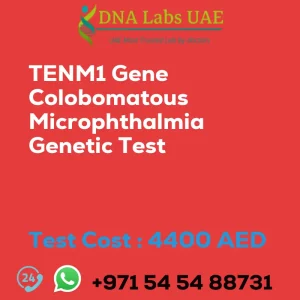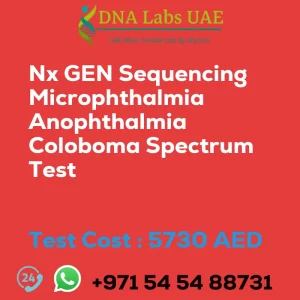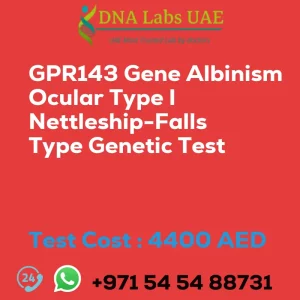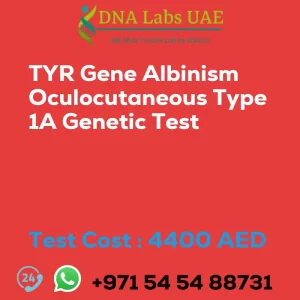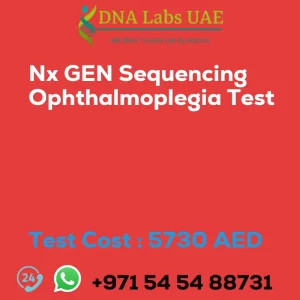TGFBI Gene Corneal Dystrophy Epithelial Basement Membrane Genetic Test
Welcome to DNA Labs UAE, where we offer the TGFBI gene corneal dystrophy epithelial basement membrane genetic test. This test can help diagnose corneal dystrophy and guide treatment options. Read on to learn more about the test details, components, price, and more.
Test Components and Price
The TGFBI gene corneal dystrophy epithelial basement membrane genetic test is priced at 4400.0 AED. The test requires a blood or extracted DNA sample, or one drop of blood on an FTA card.
Report Delivery
After the sample is collected, the report will be delivered within 3 to 4 weeks.
Method and Test Type
The TGFBI gene corneal dystrophy epithelial basement membrane genetic test uses NGS (Next-Generation Sequencing) technology. NGS technology allows for a more comprehensive analysis of genetic mutations by sequencing multiple genes simultaneously. The test type is specifically focused on ophthalmology disorders.
Doctor and Test Department
The test is conducted by an ophthalmologist, who specializes in eye disorders. The test department responsible for conducting the TGFBI gene corneal dystrophy epithelial basement membrane genetic test is Genetics.
Pre-Test Information
Before undergoing the TGFBI gene corneal dystrophy epithelial basement membrane genetic test, it is important to provide the clinical history of the patient. Additionally, a genetic counseling session may be conducted to draw a pedigree chart of family members affected by TGFBI gene corneal dystrophy. This information helps in the analysis and interpretation of the test results.
Test Details
The TGFBI gene is responsible for producing the TGFBI protein, which maintains the integrity of the cornea. Mutations in this gene can lead to corneal dystrophy, a group of genetic disorders that affect the cornea and can cause vision loss. Epithelial basement membrane corneal dystrophy (EBMD) is a specific type of corneal dystrophy that affects the layer of tissue separating the corneal epithelium from the stroma. Symptoms of EBMD include blurred vision and recurrent corneal erosions.
NGS genetic testing, also known as next-generation sequencing, allows for a comprehensive analysis of genetic mutations. This type of testing can help diagnose TGFBI gene corneal dystrophy and EBMD, and guide treatment options. It can also identify carriers of the gene mutation, which is valuable for family planning and genetic counseling.
If you suspect TGFBI gene corneal dystrophy or EBMD, our TGFBI gene corneal dystrophy epithelial basement membrane genetic test using NGS technology can provide you with the necessary information for diagnosis and treatment. Contact DNA Labs UAE today to schedule your test.
| Test Name | TGFBI Gene Corneal dystrophy epithelial basement membrane Genetic Test |
|---|---|
| Components | |
| Price | 4400.0 AED |
| Sample Condition | Blood or Extracted DNA or One drop Blood on FTA Card |
| Report Delivery | 3 to 4 Weeks |
| Method | NGS Technology |
| Test type | Ophthalmology Disorders |
| Doctor | Ophthalmologist |
| Test Department: | Genetics |
| Pre Test Information | Clinical History of Patient who is going for TGFBI Gene Corneal dystrophy, epithelial basement membrane NGS Genetic DNA Test. A Genetic Counselling session to draw a pedigree chart of family members affected with TGFBI Gene Corneal dystrophy, epithelial basement membrane NGS Genetic DNA Test gene TGFBI |
| Test Details |
The TGFBI gene is responsible for producing a protein called transforming growth factor beta-induced (TGFBI) protein, which is involved in maintaining the integrity of the cornea. Mutations in this gene can lead to corneal dystrophy, a group of genetic disorders that affect the cornea and can lead to vision loss. Epithelial basement membrane corneal dystrophy (EBMD) is a type of corneal dystrophy that affects the epithelial basement membrane, which is a layer of tissue that separates the corneal epithelium from the stroma. EBMD can cause blurred vision, recurrent corneal erosions, and other symptoms. NGS genetic testing, also known as next-generation sequencing, is a type of genetic testing that uses advanced technology to sequence multiple genes simultaneously. This allows for a more comprehensive analysis of genetic mutations and can help identify the underlying cause of a patient’s symptoms. A genetic test for TGFBI gene corneal dystrophy and EBMD using NGS technology can help diagnose these conditions and guide treatment options. It can also help identify carriers of the gene mutation, which can be important for family planning and genetic counseling. |


